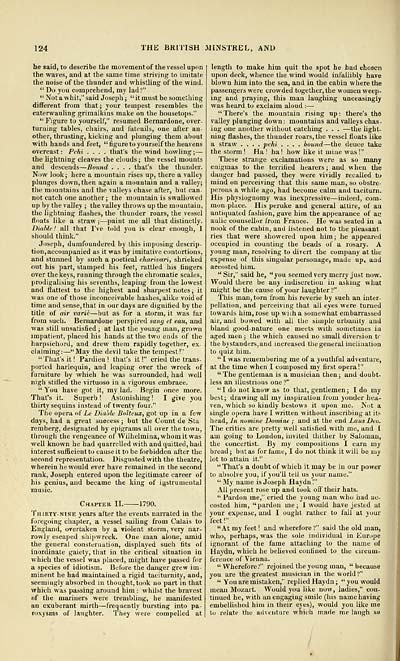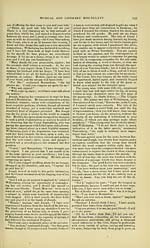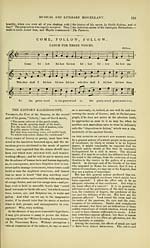Glen Collection of printed music > Printed music > British minstrel, and musical and literary miscellany
(132) Page 124
Download files
Complete book:
Individual page:
Thumbnail gallery: Grid view | List view

124
THE BRITISH .MINSTREL, ANU
he said, to describe tlie movement of the vessel upon
the waves, and at the same time striving to imitate
the noise of the thunder and whistling of the wind.
" Do you comprehend, my lad?"
"Not a whit," said Joseph; "it must be something
different from that; your tempest resembles the
caterwauling grimalkins make on the housetops."
" Figure to yourself," resumed Bernardone, over-
turning tables, chairs, and fateuils, one after an-
other, thrusting, kicking and plunging them about
with hands and feet, "figuretoyourself the heavens
overcast: Pchi .... that's the wind howling; —
the lightning cleaves the clouds ; the vessel mounts
and descends — Bound .... that's the thunder.
Now look; here a mountain rises up, there a valley
plunges down, then again a mountain and a valley;
the mountains and the valleys chase after, but can-
not catch one another ; the mountain is swallowed
up by the valley ; the valley throws up the mountain,
the lightning flashes, the thunder roars, the vessel
floats like a straw ; — paint me all that distinctly.
Viable! all that I've told you is clear enough, I
should think."
Joseph, dumfoundered by this imposing descrip-
tion, accompanied as it was by imitative contortions,
and stunned by such a poetical charivari, shrieked
out his part, stamped his feet, rattled his fingers
over the keys, running through the chromatic scales,
prodigalising his sevenths, leaping from the lowest
and flattest to the highest and sharpest notes ; it
was one of those inconceivable hashes, alike void of
time and sense, that in our days are dignitied by the
title of air varie — but as for a storm, it was lar
from such. Bernardone perspired sang et eau, and
was still unsatisfied ; at last the young man, grown
impatient, placed his hands at the two ends of the
harpsichord, and drew them rapidly together, ex-
chiiming: — "May the devil take the tempest!"
" That's it ! Pardieu ! that's it !" cried the trans,
ported harlequin, and leaping over the wreck of
furniture by which he was surrounded, had well
nigh stifled the virtuoso in a vigorous embrace.
" You have got it, my lad. Begin once more.
That's it. Superb ! Astonishing ! I give you
thirty sequins instead of twenty four."
The opera of ie Diable Boitcux, got up in a few
days, had a great success ; but the Count de Sta
remberg, designated by epigrams all over the town,
through the vengeance of Wilhelmina, whom it was
well known he had quarrelled with and quitted, had
interest sufficient to cause it to be forbidden after the
second representation. Disgusted with the theatre,
wherein he would ever have remained in the second
rank, Joseph entered upon the legitimate career of
his genius, and became the king of instrumental
music.
Chapter II.-
-1790.
Thirtv-nine years after the events narrated in the
foregoing chapter, a vessel sailing from Calais to
England, overtaken by a violent storm, very nar-
rowly escaped shipwreck. One man alone, amid
the general consternation, displayed such fits of
inordinate gaiety, that in the critical situation in
which the vessel was placed, might have passed for
a species of idiotism. Before the danger grew im
minent he had maintained a rigid taciturnity, and,
seemingly absorbed in thought, took no part in that
which was passing around him : whilst the bravest
of the mariners were trembhng, he manifested
an exuberant mirth — frequently bursting into pa-
roxysms of laiighter. They were compelled at
length to make him quit the spot he had chosen
upon deck, wlience the wind would infallibly have
blown him into the sea, and in the cabin where the
passengers were crowded together, the women weep-
ing and praying, this man laughing unceasingly
was heard to exclaim aloud : —
"There's the mountain rising up: there's the
valley plunging down: mountains and valleys chas-
ing one another without catching . . . — the light-
ning flashes, the thunder roars, the vessel floats like
a straw .... pchi .... bound — the deuce take
the storm ! Ha ! ha ! how like it mine was !"
These strange exclamations were as so many
enigmas to the terrified hearers ; and when the
danger had passed, they were vividly recalled to
mind on perceiving that this same man, so obstre-
perous a while ago, had become calm and taciturn.
His physiognomy was inexpressive — indeed, com-
mon place. His peruke and general attire, of an
antiquated fashion, gave him the appearance of an
aulic counsellor from f'rance. He was seated in a
nook of the cabin, and listened not to the pleasant-
ries that were showered upon him; he appeared
occupied in counting the beads of a rosary. A
young man, resolving to divert the company at the
expense of this singular personage, made up, and
accosted him.
" Sir, " said he, "you seemed very merry just now.
Would there be any indiscretion in asking what
might be the cause of your laughter?"
This man, torn from his reverie by such an inter-
pellation, and perceiving that all eyes were turned
towards him, rose up wiih a somewhat embarrassed
air, and bowed with all the simple urbanity and
bland good-nature one meets with sometimes in
aged men ; the which caused no small diversion tc
the bystanders,and increased the general inclination
to quiz him.
" I was remembering me of a youthful adventure,
at the time when I composed my first opera!"
"The gentleman is a musician then; and doubt-
less an illustrious one ?"
" I do not know as to that, gentlemen ; I do my
best; drawing all my inspiration from yonder hea-
ven, which so kindly bestows it upon me. Not a
single opera have I written without inscribing at it:-
head. In nomine Domimi ; and at the end Laus Deo.
The critics are pretty well satisfied with me, and I
am going to London, invited thither by Salomau,
the concertist. By my compositions I earn my
bread; but as for fame, I do not think it will be my
lot to attain it."
" That's a doubt of which it may be in our power
to absolve you, if you'll tell us your name."
"My name is Joseph Haydn!"
All present rose up and took ofl' their hats.
" Pardon me," cried the young man who had ac-
costed him, "pardon me; 1 would have jested at
your expense, and I ought rather to fall at your
feet !"
"At my feet ! and wherefore?" said the old man,
who, perhaps, was the sole individual in Europe
ignorant of the fame attaching to the name ol
Haydn, which he believed confined to the circum-
fereuce of Vienna.
"Wherefore?" rejoined the young man, "because
you are the greatest musician in the world ?"
" You are mistaken," replied Haydn ; " you would
mean Mozart. Would you like now, ladies," con-
tinued he, with an engaging smile (his name having
embellished him in their eyes), would you like me
to relate the adventure which made me laugh so
THE BRITISH .MINSTREL, ANU
he said, to describe tlie movement of the vessel upon
the waves, and at the same time striving to imitate
the noise of the thunder and whistling of the wind.
" Do you comprehend, my lad?"
"Not a whit," said Joseph; "it must be something
different from that; your tempest resembles the
caterwauling grimalkins make on the housetops."
" Figure to yourself," resumed Bernardone, over-
turning tables, chairs, and fateuils, one after an-
other, thrusting, kicking and plunging them about
with hands and feet, "figuretoyourself the heavens
overcast: Pchi .... that's the wind howling; —
the lightning cleaves the clouds ; the vessel mounts
and descends — Bound .... that's the thunder.
Now look; here a mountain rises up, there a valley
plunges down, then again a mountain and a valley;
the mountains and the valleys chase after, but can-
not catch one another ; the mountain is swallowed
up by the valley ; the valley throws up the mountain,
the lightning flashes, the thunder roars, the vessel
floats like a straw ; — paint me all that distinctly.
Viable! all that I've told you is clear enough, I
should think."
Joseph, dumfoundered by this imposing descrip-
tion, accompanied as it was by imitative contortions,
and stunned by such a poetical charivari, shrieked
out his part, stamped his feet, rattled his fingers
over the keys, running through the chromatic scales,
prodigalising his sevenths, leaping from the lowest
and flattest to the highest and sharpest notes ; it
was one of those inconceivable hashes, alike void of
time and sense, that in our days are dignitied by the
title of air varie — but as for a storm, it was lar
from such. Bernardone perspired sang et eau, and
was still unsatisfied ; at last the young man, grown
impatient, placed his hands at the two ends of the
harpsichord, and drew them rapidly together, ex-
chiiming: — "May the devil take the tempest!"
" That's it ! Pardieu ! that's it !" cried the trans,
ported harlequin, and leaping over the wreck of
furniture by which he was surrounded, had well
nigh stifled the virtuoso in a vigorous embrace.
" You have got it, my lad. Begin once more.
That's it. Superb ! Astonishing ! I give you
thirty sequins instead of twenty four."
The opera of ie Diable Boitcux, got up in a few
days, had a great success ; but the Count de Sta
remberg, designated by epigrams all over the town,
through the vengeance of Wilhelmina, whom it was
well known he had quarrelled with and quitted, had
interest sufficient to cause it to be forbidden after the
second representation. Disgusted with the theatre,
wherein he would ever have remained in the second
rank, Joseph entered upon the legitimate career of
his genius, and became the king of instrumental
music.
Chapter II.-
-1790.
Thirtv-nine years after the events narrated in the
foregoing chapter, a vessel sailing from Calais to
England, overtaken by a violent storm, very nar-
rowly escaped shipwreck. One man alone, amid
the general consternation, displayed such fits of
inordinate gaiety, that in the critical situation in
which the vessel was placed, might have passed for
a species of idiotism. Before the danger grew im
minent he had maintained a rigid taciturnity, and,
seemingly absorbed in thought, took no part in that
which was passing around him : whilst the bravest
of the mariners were trembhng, he manifested
an exuberant mirth — frequently bursting into pa-
roxysms of laiighter. They were compelled at
length to make him quit the spot he had chosen
upon deck, wlience the wind would infallibly have
blown him into the sea, and in the cabin where the
passengers were crowded together, the women weep-
ing and praying, this man laughing unceasingly
was heard to exclaim aloud : —
"There's the mountain rising up: there's the
valley plunging down: mountains and valleys chas-
ing one another without catching . . . — the light-
ning flashes, the thunder roars, the vessel floats like
a straw .... pchi .... bound — the deuce take
the storm ! Ha ! ha ! how like it mine was !"
These strange exclamations were as so many
enigmas to the terrified hearers ; and when the
danger had passed, they were vividly recalled to
mind on perceiving that this same man, so obstre-
perous a while ago, had become calm and taciturn.
His physiognomy was inexpressive — indeed, com-
mon place. His peruke and general attire, of an
antiquated fashion, gave him the appearance of an
aulic counsellor from f'rance. He was seated in a
nook of the cabin, and listened not to the pleasant-
ries that were showered upon him; he appeared
occupied in counting the beads of a rosary. A
young man, resolving to divert the company at the
expense of this singular personage, made up, and
accosted him.
" Sir, " said he, "you seemed very merry just now.
Would there be any indiscretion in asking what
might be the cause of your laughter?"
This man, torn from his reverie by such an inter-
pellation, and perceiving that all eyes were turned
towards him, rose up wiih a somewhat embarrassed
air, and bowed with all the simple urbanity and
bland good-nature one meets with sometimes in
aged men ; the which caused no small diversion tc
the bystanders,and increased the general inclination
to quiz him.
" I was remembering me of a youthful adventure,
at the time when I composed my first opera!"
"The gentleman is a musician then; and doubt-
less an illustrious one ?"
" I do not know as to that, gentlemen ; I do my
best; drawing all my inspiration from yonder hea-
ven, which so kindly bestows it upon me. Not a
single opera have I written without inscribing at it:-
head. In nomine Domimi ; and at the end Laus Deo.
The critics are pretty well satisfied with me, and I
am going to London, invited thither by Salomau,
the concertist. By my compositions I earn my
bread; but as for fame, I do not think it will be my
lot to attain it."
" That's a doubt of which it may be in our power
to absolve you, if you'll tell us your name."
"My name is Joseph Haydn!"
All present rose up and took ofl' their hats.
" Pardon me," cried the young man who had ac-
costed him, "pardon me; 1 would have jested at
your expense, and I ought rather to fall at your
feet !"
"At my feet ! and wherefore?" said the old man,
who, perhaps, was the sole individual in Europe
ignorant of the fame attaching to the name ol
Haydn, which he believed confined to the circum-
fereuce of Vienna.
"Wherefore?" rejoined the young man, "because
you are the greatest musician in the world ?"
" You are mistaken," replied Haydn ; " you would
mean Mozart. Would you like now, ladies," con-
tinued he, with an engaging smile (his name having
embellished him in their eyes), would you like me
to relate the adventure which made me laugh so
Set display mode to: Large image | Transcription
Images and transcriptions on this page, including medium image downloads, may be used under the Creative Commons Attribution 4.0 International Licence unless otherwise stated. ![]()
| Special collections of printed music > Glen Collection of printed music > Printed music > British minstrel, and musical and literary miscellany > (132) Page 124 |
|---|
| Permanent URL | https://digital.nls.uk/91436529 |
|---|
| Description | Scottish songs and music of the 18th and early 19th centuries, including music for the Highland bagpipe. These are selected items from the collection of John Glen (1833 to 1904). Also includes a few manuscripts, some treatises, and other books on the subject. |
|---|
| Description | The Glen Collection and the Inglis Collection represent mainly 18th and 19th century Scottish music, including Scottish songs. The collections of Berlioz and Verdi collected by bibliographer Cecil Hopkinson contain contemporary and later editions of the works of the two composers Berlioz and Verdi. |
|---|

